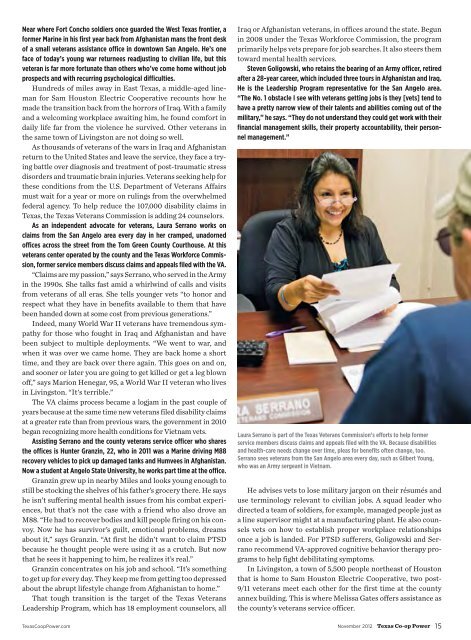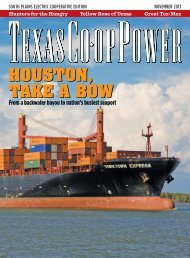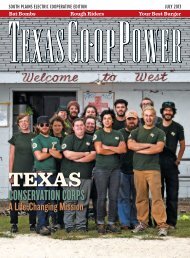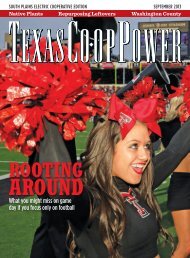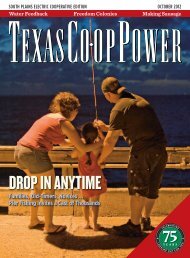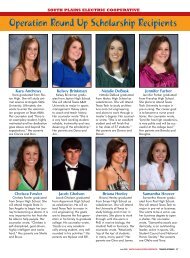November 2012PDF 5.57 MB - South Plains Electric Cooperative
November 2012PDF 5.57 MB - South Plains Electric Cooperative
November 2012PDF 5.57 MB - South Plains Electric Cooperative
You also want an ePaper? Increase the reach of your titles
YUMPU automatically turns print PDFs into web optimized ePapers that Google loves.
Near where Fort Concho soldiers once guarded the West Texas frontier, a<br />
former Marine in his first year back from Afghanistan mans the front desk<br />
of a small veterans assistance office in downtown San Angelo. He’s one<br />
face of today’s young war returnees readjusting to civilian life, but this<br />
veteran is far more fortunate than others who’ve come home without job<br />
prospects and with recurring psychological difficulties.<br />
Hundreds of miles away in East Texas, a middle-aged lineman<br />
for Sam Houston <strong>Electric</strong> <strong>Cooperative</strong> recounts how he<br />
made the transition back from the horrors of Iraq. With a family<br />
and a welcoming workplace awaiting him, he found comfort in<br />
daily life far from the violence he survived. Other veterans in<br />
the same town of Livingston are not doing so well.<br />
As thousands of veterans of the wars in Iraq and Afghanistan<br />
return to the United States and leave the service, they face a trying<br />
battle over diagnosis and treatment of post-traumatic stress<br />
disorders and traumatic brain injuries. Veterans seeking help for<br />
these conditions from the U.S. Department of Veterans Affairs<br />
must wait for a year or more on rulings from the overwhelmed<br />
federal agency. To help reduce the 107,000 disability claims in<br />
Texas, the Texas Veterans Commission is adding 24 counselors.<br />
As an independent advocate for veterans, Laura Serrano works on<br />
claims from the San Angelo area every day in her cramped, unadorned<br />
offices across the street from the Tom Green County Courthouse. At this<br />
veterans center operated by the county and the Texas Workforce Commission,<br />
former service members discuss claims and appeals filed with the VA.<br />
“Claims are my passion,” says Serrano, who served in the Army<br />
in the 1990s. She talks fast amid a whirlwind of calls and visits<br />
from veterans of all eras. She tells younger vets “to honor and<br />
respect what they have in benefits available to them that have<br />
been handed down at some cost from previous generations.”<br />
Indeed, many World War II veterans have tremendous sympathy<br />
for those who fought in Iraq and Afghanistan and have<br />
been subject to multiple deployments. “We went to war, and<br />
when it was over we came home. They are back home a short<br />
time, and they are back over there again. This goes on and on,<br />
and sooner or later you are going to get killed or get a leg blown<br />
off,” says Marion Henegar, 95, a World War II veteran who lives<br />
in Livingston. “It's terrible.”<br />
The VA claims process became a logjam in the past couple of<br />
years because at the same time new veterans filed disability claims<br />
at a greater rate than from previous wars, the government in 2010<br />
began recognizing more health conditions for Vietnam vets.<br />
Assisting Serrano and the county veterans service officer who shares<br />
the offices is Hunter Granzin, 22, who in 2011 was a Marine driving M88<br />
recovery vehicles to pick up damaged tanks and Humvees in Afghanistan.<br />
Now a student at Angelo State University, he works part time at the office.<br />
Granzin grew up in nearby Miles and looks young enough to<br />
still be stocking the shelves of his father’s grocery there. He says<br />
he isn’t suffering mental health issues from his combat experiences,<br />
but that’s not the case with a friend who also drove an<br />
M88. “He had to recover bodies and kill people firing on his convoy.<br />
Now he has survivor’s guilt, emotional problems, dreams<br />
about it,” says Granzin. “At first he didn’t want to claim PTSD<br />
because he thought people were using it as a crutch. But now<br />
that he sees it happening to him, he realizes it’s real.”<br />
Granzin concentrates on his job and school. “It’s something<br />
to get up for every day. They keep me from getting too depressed<br />
about the abrupt lifestyle change from Afghanistan to home.”<br />
That tough transition is the target of the Texas Veterans<br />
Leadership Program, which has 18 employment counselors, all<br />
Iraq or Afghanistan veterans, in offices around the state. Begun<br />
in 2008 under the Texas Workforce Commission, the program<br />
primarily helps vets prepare for job searches. It also steers them<br />
toward mental health services.<br />
Steven Goligowski, who retains the bearing of an Army officer, retired<br />
after a 28-year career, which included three tours in Afghanistan and Iraq.<br />
He is the Leadership Program representative for the San Angelo area.<br />
“The No. 1 obstacle I see with veterans getting jobs is they [vets] tend to<br />
have a pretty narrow view of their talents and abilities coming out of the<br />
military,” he says. “They do not understand they could get work with their<br />
financial management skills, their property accountability, their personnel<br />
management.”<br />
Laura Serrano is part of the Texas Veterans Commission’s efforts to help former<br />
service members discuss claims and appeals filed with the VA. Because disabilities<br />
and health-care needs change over time, pleas for benefits often change, too.<br />
Serrano sees veterans from the San Angelo area every day, such as Gilbert Young,<br />
who was an Army sergeant in Vietnam.<br />
He advises vets to lose military jargon on their résumés and<br />
use terminology relevant to civilian jobs. A squad leader who<br />
directed a team of soldiers, for example, managed people just as<br />
a line supervisor might at a manufacturing plant. He also counsels<br />
vets on how to establish proper workplace relationships<br />
once a job is landed. For PTSD sufferers, Goligowski and Serrano<br />
recommend VA-approved cognitive behavior therapy programs<br />
to help fight debilitating symptoms.<br />
In Livingston, a town of 5,500 people northeast of Houston<br />
that is home to Sam Houston <strong>Electric</strong> <strong>Cooperative</strong>, two post-<br />
9/11 veterans meet each other for the first time at the county<br />
annex building. This is where Melissa Gates offers assistance as<br />
the county’s veterans service officer.<br />
TexasCoopPower.com <strong>November</strong> 2012 Texas Co-op Power 15


